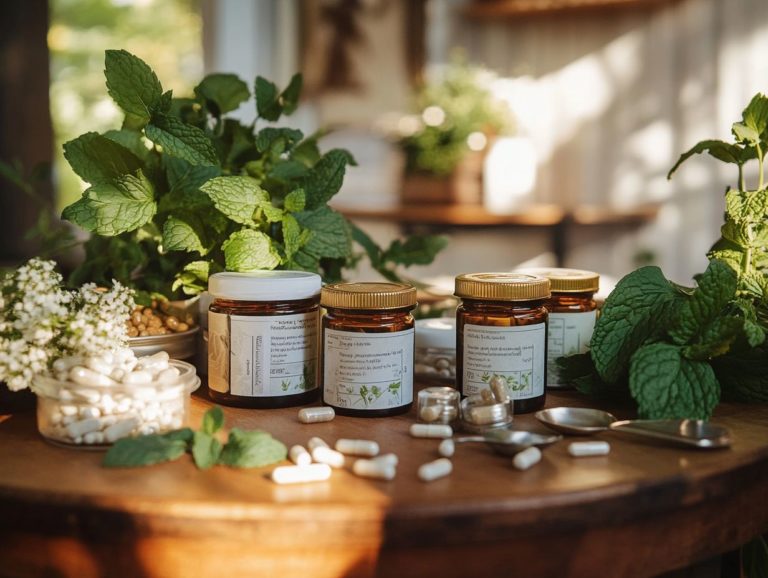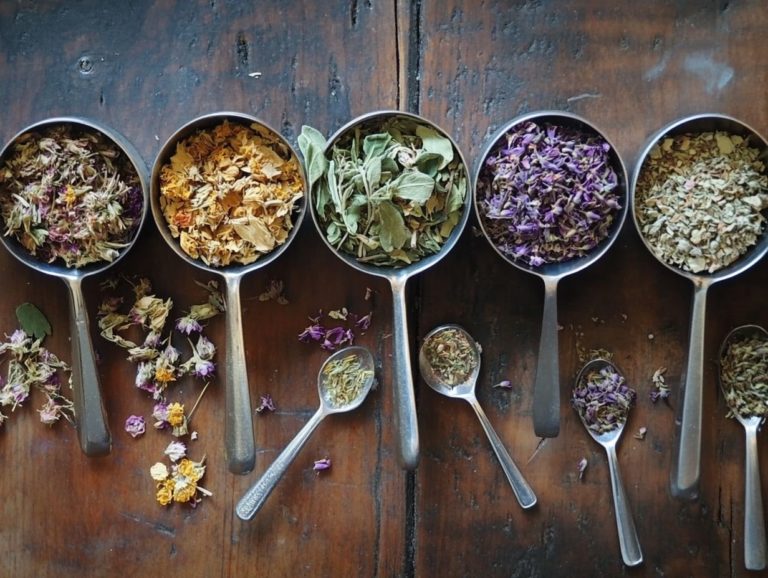Herbal Dosage: A Guide for First-Time Users
Herbal remedies have become increasingly popular as natural alternatives for a range of health conditions. Understanding the right dosage is essential for safe and effective use. This is highlighted in the comprehensive source “Herbal Medicines,” published by Pharmaceutical Press (ISBN 0857110357) on 2013-01-21.
This guide clarifies what herbal dosage entails and the various factors that influence it. These factors include your body weight, age, and any existing health conditions you might have, as discussed in the extensively referenced publication, “Mosby’s Handbook of Herbs.”
You ll discover different forms of herbs and how to measure dosages accurately. Additionally, you’ll find essential tips tailored for first-time users, including contraindications warnings to ensure safe usage.
Whether you re intrigued by herbal treatments or seeking to enhance your wellness routine through evidence-based information, this article has everything you need to navigate the world of herbal remedies with confidence. Ready to explore herbal remedies? Let s dive in!
Contents
Key Takeaways:

- Always consult with a healthcare professional before starting any herbal supplements. Factors like body weight, age, and health conditions can affect the appropriate herbal dosage for an individual.
- Common herbal dosage forms include capsules, tinctures, teas, and extracts, each with its own specific uses and benefits.
- When calculating and measuring herbal dosage, use accurate conversion methods and tools. Follow the dos and don’ts for first-time users for the best experience.
Understanding Herbal Dosage
Grasping the nuances of herbal dosage is essential for both healthcare professionals and individuals seeking the benefits of herbal medicinal products in treating and preventing health problems. This includes recognizing their long history and popularity in various cultures. Herbal remedies, celebrated for their healing attributes, demand meticulous dosage to ensure both safety and effectiveness.
More people are seeking natural supplements, making the quest for evidence-based insights on precise dosages, contraindications, side effects, and potential interactions more urgent. This guide is your key to making informed choices!
What is Herbal Dosage?
Herbal dosage refers to the precise amount of a herbal medicinal product you administer to achieve the desired therapeutic effects while minimizing any potential risks. Determining the appropriate dosage is crucial, as it can significantly impact both the efficacy and safety of the treatment.
In clinical settings, consider various factors such as the patient’s age, weight, and health conditions when calculating dosages. Updated monographs detailed documents that provide evidence-based information about herbal products play a vital role in this process, especially in understanding the risks of improper herbal dosage.
These resources ensure that you have access to the latest research and data from the National Institute. They guide you in making informed decisions that optimize patient care while reducing the likelihood of adverse effects.
Factors Affecting Herbal Dosage
Several key factors significantly influence herbal dosage, including your body weight, age, and specific health conditions. These factors can alter how herbal medicines work in your system. Understanding these variables is essential for healthcare professionals and herbal practitioners to customize treatments effectively for you.
For example, older patients may metabolize herbs differently compared to younger adults. This means that dosage forms might need to be adjusted accordingly based on the pharmacological actions of specific herbal ingredients. Existing health issues can dictate particular contraindications or heighten the risk of adverse reactions.
Body Weight, Age, and Health Conditions

Body weight, age, and health conditions are vital factors in tailoring herbal dosages to maximize both safety and effectiveness.
If you have a lower body weight, you might need a smaller dosage to avoid potential toxicity. Conversely, as an older adult, changes in metabolism may require adjustments in how herbal remedies are administered, particularly considering the role of body weight in herbal dosage.
Existing health conditions, like liver or kidney issues, can dramatically affect how your body processes certain herbal ingredients. This may lead to interactions with any prescription medications, making careful monitoring by healthcare professionals essential.
By assessing these factors, practitioners can create personalized treatment plans that minimize side effects and specifically address your health challenges. This ultimately optimizes therapeutic outcomes just for you!
Herbal Dosage Forms
Herbal dosage forms comprise a diverse array of preparations, such as tinctures, extracts, powders, and capsules. Each form is meticulously crafted to enhance the delivery of therapeutic benefits.
Understanding how different plant compounds work helps you choose the right form for patient management. The choice of dosage form can significantly impact how well your body can use the active ingredients and overall effectiveness.
Common Forms and Their Uses
Common forms of herbal medicines include capsules, teas, tinctures, and topical applications. Each has unique therapeutic purposes tailored to your needs in herbal therapies.
These variations cater to different preferences. For example, capsules offer a convenient option for those who may not enjoy the taste of herbs. Teas provide a gentle infusion, perfect for soothing ailments like anxiety or digestive issues.
Tinctures take it up a notch, employing alcohol extraction to concentrate active compounds, making them both potent and quick-acting. As for topical applications, think ointments and creams ideal for targeted relief from pain or skin conditions.
It’s vital to ensure you are using the appropriate dosage to maximize benefits while minimizing potential side effects. Following the practices of medical herbalists is key, especially with resources like the 5 essential herbal preparations for beginners that provide valuable insights. Don’t miss out on the benefits!
Calculating and Measuring Herbal Dosage
Calculating and measuring herbal dosages with precision is essential for ensuring the safe and effective use of herbal medicinal products. This is particularly true when tailoring specific dosages to individual needs.
Healthcare professionals rely on various measuring tools and conversion methods to pinpoint the exact quantity of herbal remedies needed for optimal therapeutic benefits.
This meticulous process is vital. Improper dosages can result in adverse reactions or reduced effectiveness. This highlights the importance of careful patient management and reliance on evidence-based references.
Consult a healthcare provider for personalized advice on herbal dosages to ensure you maximize your health benefits!
Conversion Methods and Tools

Conversion methods and tools are vital for you to measure herbal dosages accurately. This ensures effective treatments as an herbal practitioner.
These measurements maintain consistency in your herbal formulations and are crucial for patient safety. Having precision scales at your disposal is critical for weighing dried herbs accurately. In contrast, graduated syringes help you dose liquid extracts correctly, following the guidelines from trusted sources.
Using conversion calculators can assist in adjusting dosages according to individual patient needs or specific conditions. This practice is supported by clinical aspects outlined in the “Natural Standard Herb and Supplement Guide.” Understanding the key ingredients that work in the body in various herbs, along with herbal dosage guidelines for pregnant women, enables you to tailor treatments effectively.
Ultimately, utilizing these tools boosts the trust in herbal remedies, making integration into both clinical settings and personal wellness plans easier. This reinforces the importance of evidence-based references in your practice.
Tips for First-Time Users
Be excited but cautious as you explore herbal therapies. It’s crucial to be aware of the essential dos and don’ts for safe and effective use, particularly regarding contraindications and potential interactions with other therapies.
Understanding contraindications, potential interactions with other medications, and specific dosage recommendations is key to maintaining your safety and reaping the health benefits, as highlighted in the publication by Dr. Joanne Barnes and Dr. Michael Smith.
Consulting healthcare professionals can provide valuable guidance on how to seamlessly integrate herbal remedies into your self-care routine. This ensures you access impartial information on treatment options.
Dos and Don’ts for Safe and Effective Use
Understanding the dos and don’ts of herbal medicine is essential for ensuring your safety and avoiding unwanted reactions.
As you embark on your journey with herbal therapies, it’s crucial to be well-informed about the practices that will help you maximize benefits while minimizing risks. Recognizing the importance of sourcing quality herbs can significantly impact your therapeutic outcomes. Relying on reputable suppliers prevents contamination and ensures potency, a point emphasized in the evidence-based references provided by the National Institute.
Before starting any regimen, consult healthcare professionals to discuss specific dosages or treatment plans, including how to create a safe herbal dosage plan that is best suited for your health concerns. This step is vital for avoiding harmful interactions with prescribed medications.
Keep track of how different herbs affect you. This will help you tailor a suitable protocol and enable you to make informed adjustments as you navigate your herbal journey.
Frequently Asked Questions
What is herbal dosage?

Herbal dosage refers to the recommended amount of a specific herbal supplement or remedy to take to achieve the desired effect. Follow the recommended dosage instructions to ensure safety and effectiveness.
How do I determine the right herbal dosage for me?
The appropriate herbal dosage can vary based on factors such as age, weight, and health condition. It’s best to consult with a healthcare professional or follow the instructions on the product label for proper dosage.
Are there any risks associated with taking herbal supplements?
Although generally considered safe, herbal supplements can pose risks if taken in incorrect dosages. It’s important to follow recommended dosage instructions and consult with a healthcare professional before starting any new supplement.
Can I take more than the recommended herbal dosage?
No, you should not exceed the recommended herbal dosage. Doing so can lead to harmful side effects or interactions with other medications.
It’s essential to stick to the recommended dosage for your safety and health!
What should I do if I miss a dose of my herbal supplement?
If you miss a dose, do not take two doses at once. Just take the supplement at your next scheduled time.
If you’re unsure about what to do, consult with a healthcare professional for guidance.
How long should I take herbal supplements before seeing results?
The time it takes to see results can vary based on individual factors and the quality of the supplement. Follow the dosage instructions to give the supplement enough time to work.
This patience can lead to the results you re looking for!






